Dear reader,
How are you? I’m back with another reader question. I really enjoy your questions. They invite me to reflect on subjects I usually wouldn’t write about, so thank you for sending these. Today, I’ll reveal my feelings about the cozy web, my biggest pet peeve.
Caddie asked: I would love to hear your thoughts on how to make sure your phone is more cozy web oriented. How do you personally curate your phone to be attuned to the internet understory? Is it as simple as not having as many apps? Any apps that you recommend?
For those who are blessed by not knowing what the cozy web means, it is a term used to describe the group chats and similar gate-kept spaces we use to communicate online while we are hiding from all the trolls and extremists who, assumingly, have taken over the internet.
The latter annoys me: the assumption that the internet is a terrible place, a dark forest where all the good people and spirits have left the public sphere and are now hiding in private, cozy spaces.
I’m aware it is not only poetry and care growing on the internet. Yet, every week for seven years, I have filled this newsletter with links to good things existing on the openly available internet. My friend Matt Muir, who writes Web Curios, the single most impressive internet canon existing, has written his weekly newsletter for fifteen years, with each edition averaging nearly 10,000 words or a combined length of roughly ten Bibles.
One day, I’d like to write an essay challenging the notion of the Dark Forest Theory of the Internet and the many assumptions and unanswered questions: Are semi-private spaces online anything new? What about the forums and mailing list of the 90s?And even if we assume it is correct that we are moving our online conversation to private spaces, how can we know what drives the migration? Is it because of trolls and extremists? Or is it because of boredom or frustration with the dominant public platforms and their leaders? Or a need to earn money by creating invite-only Discord servers to be coupled with precarious earnings as online creators? Or is it all just a reflection of the general rise of extremist parties in many countries?
What I’m getting at: you wouldn’t believe anyone telling you that books are bad, so why believe people telling you that the internet is bad? Furthermore, even if the diagnosis is correct and the internet is a dark and terrible place, it is still not a prescription. To paraphrase David Graeber: “The ultimate, hidden truth of the internet is that it is something that we make, and could just as easily make differently.” Maybe we should stop publishing essays encouraging companies and people to divest from the open web and instead show how they could contribute to a rich and sprawling public internet.
Rant aside, I’d recommend three apps:
Notes — Create notes to collect what you find beautiful. I’ve notes for all my projects and every edition of this newsletter. Each note is a container waiting to be filled with what you discover. You’ll notice how this practice changes how you engage with all other apps and spaces.
Are.na — As I’ve written about here.
Instagram — Think of the algorithm as your tamagotchi or digital pet. You need to feed and train. From Instagram, I share posts to my notes and Are.na channels, and as a result, the algorithm returns with more of the same. For me it is websites, events, and opportunities.
I’m confident other readers have recommendations, so I’ve enabled comments for this post. I’d also like to hear your thoughts on the cozy web and how we can inspire people to keep the open, publicly available internet alive.
With care,
Kristoffer
𓆝 𓆟 𓆞 𓆝 𓆟
Kat Macdonald: London Community Laptop Orchestra
Kat Macdonald is a multimedia artist and composer living in London, England
What is London Community Laptop Orchestra?
We are a community based laptop orchestra, open to anyone who’s interested, with no experience required. We believe in the political and transformative potential of collective creative actions. Focusing on guerrilla performances (public performances without permission), we believe experimental music should not just be heard and experienced by everyone but can also be played by anyone, without any prior experience or training. This is aided by the accessibly and adaptability of the computer as a tool for performance.
Why did you start it?
I’ve run a few laptop orchestras through educational institutions, but this is the first one that's been entirely untethered from that landscape. I think outside of those structures, it can be hard to find creative communities doing this type of freeform work. Art spaces can curate out the amateur, enforcing a boundary between who and what we get to see. I wanted to make an ensemble that encourages both tech people and non-tech people to get involved, with an ethos that anyone can make and engage in art-making given the freedom and encouragement to experiment.
Who or what inspired you?
Our core inspiration is the Scratch Orchestra (1969-1974), with its focus on Marxist organising principles and experimentation at its forefront. Their work drives the type of pieces we want to make/ play. Also, my partner Agnes, her way of thinking about technology in an organic and tactile way inspires the way in which I want this laptop orchestra to feel unique against the likes of Stanford and PLOrk, focusing less on the cutting-edge technology and more on the laptop as an accessible tool with an expansive range of approaches to creative practice.
𖡼𖤣𖥧𖡼𓋼𖤣𖥧𓋼𓍊
Field notes
1.
What Can an Image Do? Agnes Cameron beautifully reframes how images (and websites) can mean something. It’s the latest talk published by Are.na x Naive Yearly.
2.
A Eulogy for Urban Dead. A story of how regulation against trolls and extremists has unintended consequences.
3.
Calls for Participation: The Creativity Pioneers Fund is open for applications (Due 7/4), FM[Ai]R is looking for residents (Due 10/4), Reinvent Social Platforms Residency (Due 14/4), Game Poems is open for submissions (Due 15/4), ELO Awards are open for nominations (21/4), Lullaby Machine is open for submissions (Due 1/5), and Processing Foundation is looking for fellows (Due 2/5).
4.
Poetic Web Calendar: Rewire Festival (The Hague, 6/4), Computer Care Cafe (NYC, 6/6), Seeking Mavis Beacon Screening (Colorado, 9/4), Tax Heaven (NYC, 11/4), Softer Internet Futures (London, 12/4), Calm Computing (Rotterdam, 14/4), Hello World: Rhizome World Opening Reception (NYC, 18/4), Inside Voices (Glasgow, 24/4), Extratonal: Multispecies Festival (Rotterdam, 25-27/4), Folk Computer Open House (NYC, 25/4), A Maze (Berlin, 14/5), and Demo Day (NYC, 4/6).
𖡼.𖤣𖥧𖡼.𖤣𖥧
Kiosk: Fortune Webstones
What? Ceramic fortune cookie with a message waiting for you on each tap with a phone. Each webstone is handmade in San Francisco, so each has a unique shape and color. Due to the unpredictable nature of ceramic glazes, each Fortune Webstone is completely unique and comes in 10+ color combinations.
Who? Spencer Chang is an engineer, artist, and researcher. His practice focuses on stewarding and making computer forms that embody and empower human connection and creativity.
How much? $80.00 + shipping.
❀࿐
Wayside flowers
Last email was sent to 4500 inboxes. You can send questions, comments, products, sites, links, and more to kristoffer@naiveweekly.com.





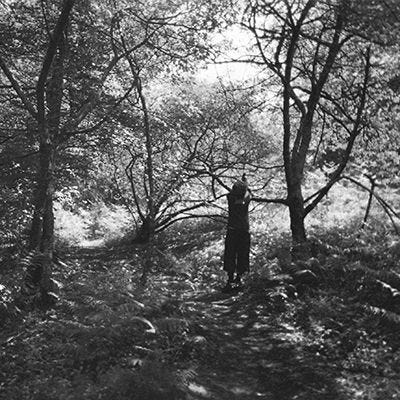
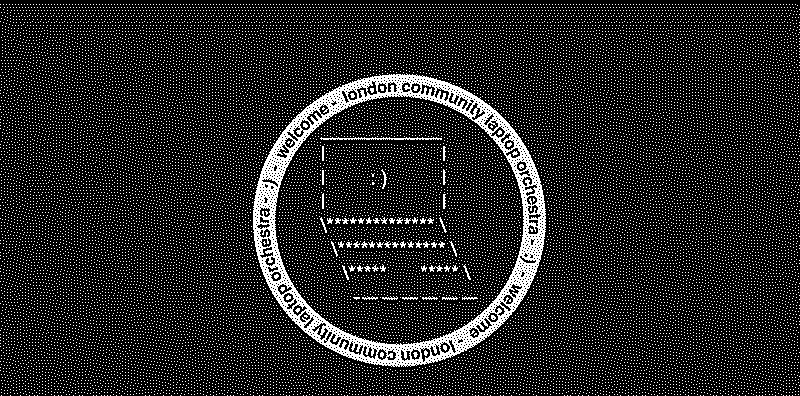
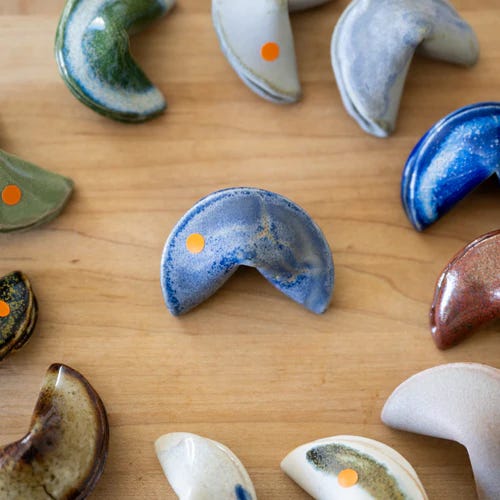
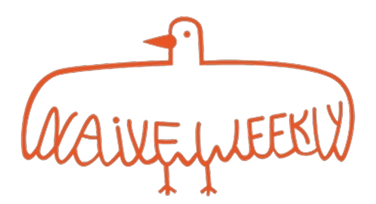







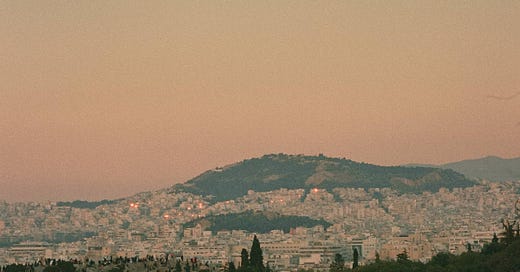



I appreciate the nod to support of the public "non-cozy" web, and am also grateful that there is a totally public commons of information. For a lot of things this makes sense to me, and for a lot of things I think being somewhere private or semi-private makes sense to (so maybe im not a dark-forest fundamementalist ? but still a cozy-web fan?)
The part about instagram algorithm as a tamagotchi pet got me though -- with meta doing stuff like this (https://bsky.app/profile/jeremymorrell.dev/post/3lm3wzk52wk2f) in the way they think about algorithms, the idea we can train their algorithms maybe seems too generous to me, even if there is some limited way to do that.
I hope I am not being a reply-guy with these opinions, since you asked for comments -- it was a provocative post!
The degree to which we are public or not is a fascinating thing to observe. If anything, it feels like a commons problem. The more we are public with using the internet as a creative medium for expression, connection, discovery vs a derivative of an advertising network, the better it could be.
What a timely post given this comment from Venkatesh: https://substack.com/profile/2264734-venkatesh-rao/note/c-106788726